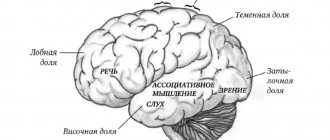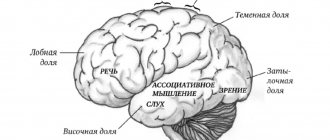Emotions are inherent in all people, they are an important component of our lives, and in our assessments of other people we are largely guided by the feelings they evoke. On the other hand, external manifestations of emotional states create a unique, inimitable image of each person. Emotionality, as a personality quality, is natural and necessary in communication, in professional activities, and in personal life. But excessive demonstration of emotions is tiring and often annoying; it interferes with normal interaction with people and is often a source of conflict. To understand what increased emotionality is associated with, you need to understand the psychology of this personal quality.
Personality emotionality
Each person's emotional system is individual. The individual psychological manifestation of emotions in each person is denoted by the concept of “personal emotionality” - this is the ability to reflect the content of experiences, mood and character. Otherwise, emotionality can be considered as a response to the world around us through the manifestation of feelings and their influence on human behavior. Emotions help to better understand each other, people can tune in to joint activities and communication, and also observe the state of the interlocutor. People belonging to different cultures are able to accurately perceive and evaluate each other’s emotional states such as delight, irritation, sadness, disappointment, pride, admiration, etc.
Emotional characteristics and emotional properties of personality
The system of feelings and typical emotional states that are formed in the process of life constitute the emotional side of the personality. Among the variety of individual emotional manifestations, emotional characteristics and emotional properties of the individual stand out.
Main Differences
in the emotional sphere, personalities are associated with differences
in the content
of human feelings, in what
,
to what objects they are directed and what kind of person’s attitude towards them they express. A person’s feelings, in the form of direct experience, express all of a person’s attitudes, including ideological, ideological, his entire attitude towards the world and, above all, towards other people. If we talk about different levels of feelings in the sense of their value, about higher and lower feelings, then we must proceed from the ideological value of the content that this or that feeling expresses. Anger can be noble and love can be despicable depending on who or what it is directed at.
Typical differences in the emotional characteristics of a person can be expressed: 1) in strong or weak emotional excitability;
2) more or less
emotional stability.
These differences in emotional excitability and stability significantly characterize a person’s temperament.
There are people who are easily ignited and quickly extinguished, just like people whose feelings cannot be immediately rekindled, but, once ignited, they will not soon cool down. Further we can distinguish: 3) the strength,
or intensity, of feelings and 4) its
depth.
A feeling that is strong in the sense of the intensity or swiftness with which it grips a person may be shallow. This is how infatuation differs from love. Love differs from infatuation primarily not by the intensity of the feeling, but by its depth, that is, not by how quickly it breaks into action, but by how deeply it penetrates into the personality. The depth of penetration of a feeling is determined by how significant this feeling and the sphere with which it is connected are so significant for a given person. Further, the breadth of distribution of the feeling also plays a significant role. It is determined by how broad and diverse are the spheres of personality with which it is intertwined. The strength of the feeling largely depends on this.
Emotional characteristics are determined by the type of nervous activity
. They are the ones who appear first in behavior and are noticed without much difficulty. If it is not easy to understand people’s relationships and feelings, then emotional characteristics are manifested in behavior more or less directly and therefore are relatively easily recorded. Through observation, it is possible to capture the strength, pace and rhythm of emotional reactions. As the skills of cultural behavior, restraint and other volitional personality traits are formed, emotional characteristics begin to manifest themselves less and less directly.
The degree of expression of emotional characteristics is very variable and ranges from mild emotional excitability in some to emotional inertia in others, from pronounced impulsiveness and affectivity to clearly expressed restraint. Strength, pace
and
the rhythm
of emotional reactions also vary and are individual for each person.
The emotional characteristics of a person together form the emotional-affective sphere, in which the dynamic side of emotional processes is expressed.
This dynamic side of emotional processes is manifested in the nature of their flow in one or another external “color” accessible to the eye, which appears in the form of involuntary expressive movements: facial expressions, pantomimes, gestures and intonation-expressive means of speech.
The dynamics of emotional processes, its external manifestations, expressive movements, in particular, do not exhaust the individual manifestations of the emotional sphere of the individual. They appear in concentrated form in the emotional properties of the individual.
To the emotional properties of personality
include impressionability, responsiveness, as well as those emotional qualities and their totality that leave their mark on many manifestations of personality and even on its entire mental appearance.
Responsiveness
is
one of the particularly important, socially significant emotional qualities of a person. Responsive is the one who responds to the joys and sorrows of other people as if they were his own. Responsiveness involves understanding the experiences of another person, since you can sympathize with another only by understanding his experiences.
The opposite quality of responsiveness is callousness.
A callous person is deaf and indifferent to people. He lives only his own life, thereby spiritually impoverishing himself. The highest degree of callousness is inhumanity and cruelty.
Impressionability
represents a unique manifestation of personality. Impressiveness is an emotional quality determined by the entire personality make-up, and above all by its cognitive attitude to the objective world and the people around it, its intellectual development.
If emotional personality traits are used as the basis for the characteristics of people, then according to this characteristic, emotional, sentimental, passionate and cold natures are distinguished.
Emotional natures
excitable, very easily “ignited” under the influence of stimuli. They are characterized by impetuosity and impulsiveness, often turning into passion. What they experience captivates them, and they do not so much think and reason about the content of the object as analyze their experiences. Impressiveness is an equally characteristic quality of emotional natures.
Sentimental natures
characterized by a penchant for contemplation. The world is reflected, as it were, through the prism of experiences and emotional states, which leave an imprint not only on the process of perception, but also determine the nature of a person’s ideas about surrounding people, objects, and events. Sentimental natures are sensitive and passive: their feelings do not cause active activity, the world of their experiences is, as it were, closed in on itself and is not associated with activity. The focus of feelings on oneself is noted, that is, the desire to admire one’s experiences.
Passionate natures
They are exceptionally efficient, impetuous and devoted to their favorite work, they live a rich and intense, emotionally rich life. They always have an object of passion. Ebullient energy and waste of energy without reserve is their characteristic feature. These are people of great, deep feelings, experiencing passion.
Comparing these three emotional types, S.L. Rubinstein writes: “Emotional natures themselves experience their feelings, surrendering to their vibrations; sentimental natures, rather, contemplate their feelings, admiring their overflows; Passionate natures live by their feelings, embodying its tension in action. For the former, affectivity dominates; they are impressionable, excitable, but more impetuous than effective; for them the feeling itself, with its exciting excitement, is more important than its object. The second are contemplative and sensitive, but passive; love for them is primarily admiration. Still others are effective; neither the experience of their feeling, nor the contemplative admiration of its object satisfies them. For them, feeling is not rapturous excitement or blissful contemplation, but a passionate desire” [Rubinstein, P. 584].
There are also people in whose lives and activities emotions do not have much significance. They are called cold natures ,
sometimes - “people of cold calculation.” Their feelings and emotional states manifest themselves to such a minimal extent that they practically have no influence on their behavior, actions and actions. They live by the arguments of reason. They are characterized by low emotional excitability, weak impressionability and what is usually called efficiency.
This typology does not exhaust and does not cover the nuances and variations that the emotional sphere imposes on a person’s mental appearance. Indeed, among the people around us, not everyone can be classified into one or another category of natures that were described above. But in all of them one can detect their inherent originality of the emotional sphere. Such characteristics may include good nature (a feeling of sympathy towards people), altruism, the basis of which is love for people, reaching a high degree of development. Such a personality quality as selfishness is also emotionally determined. After all, an egoist first of all loves himself and is guided in his life and activities by this feeling.
It should also be noted that if, by comparing emotions caused by the same object in different people, one can detect a certain similarity, then other emotional manifestations in people are strictly individual. The variety of emotional manifestations is expressed primarily in the prevailing mood of people. Under the influence of life conditions and depending on the attitude towards them, some people have a high, cheerful, cheerful mood; for others - depressed, depressed, sad; for others - capricious, irritable, etc.
It should be noted that existing differences in the manifestation of emotions and feelings largely determine the uniqueness of a particular person, i.e. determine his individuality.
By what signs can one determine the spiritual impulse of a person?
In psychology, there are several levels of expression of emotions:
- subjective plan for the manifestation of emotions (emotions are reflected in internal experiences that are closely related to the individual’s personal experience and based on it);
- manifestation of emotions in behavior (emotions are most often observed in facial expressions, gestures, movements of people, etc.);
- manifestation of emotions in speech (traced through the strength of the voice, its pitch and timbre);
- vegetative level of manifestation of emotions (changes in pulse, increased heart rate, breathing, changes in pupil diameter, electrical resistance of the skin are observed).
If you are interested in your own level of emotionality and in what areas it predominates, then we suggest you take the “Level of Emotionality” test.
Managing Emotions
In the process of interaction, it is not easy for many people to overcome barriers of mutual understanding. To avoid problems of misunderstanding with others, you need to know the basic psychological rules of communication, and first of all, learn to manage your own emotions, which most often become a source of interpersonal conflicts. The peculiarity of our feelings is that we can consciously control them. This makes them a powerful tool for successfully achieving any goal. To do this, first of all, you need to realize your emotions as early as possible, develop your innate ability to manage them, accumulate sensory experience and begin to consciously use it in your activities. In order to find out how consciously you use your emotions, we offer you V.V. Bondarenko’s test. “Do you know how to manage your emotions?”
What is emotional intelligence?
Emotional intelligence is the ability of an individual to recognize emotions, understand the intentions and desires of other people, as well as the ability to manage one’s own emotions in the process of solving practical problems. The main function of this phenomenon is to recognize one’s own and others’ emotions. Have you ever had a situation when, in the process of interacting with another person, you realized that he did not understand your feelings and experiences? Or, on the contrary, the cause of the conflict was your lack of understanding of the feelings of another person? In both cases, the level of emotional intelligence may have played a role in the emergence of misunderstandings. To learn about the characteristics of your own emotional intelligence, the site presents the D. V. Lyusin test and the N. Hall test, with the help of which you will learn about the characteristics of your personality.
General characteristics of emotional states
Emotional states are divided into feelings, emotions and affects. Emotions and feelings are at the first stage of the active process, anticipating it. This is a reflection of relationships, but not their rethinking and reflection.
Emotions and feelings can be triggered before the actual occurrence of the event. Feelings act as a motive for action and influence the personal development of the subject.
Affects are characterized by obvious changes in a person's behavior. They occur as a result of a completed action and express an emotional coloring.
They occur violently and rapidly, negatively affecting organization and the musculoskeletal system. For example, with strong anger, which turns into affect, a person activates destructive thinking, as a result of which anger turns into aggression, often accompanied by violence.
A special form of emotional states is passion , when a stable feeling influences the course of thinking and activity. The causes of passion may lie in pathological processes in the body or come from inclinations and aspirations. Often passion is objective and selective. Everything that does not have a direct connection with the subject of passion is relegated to the background and does not seem significant.
In return for extreme situations, the body experiences the following state – stress . It has a negative impact on the psyche and can trigger the development of a mental disorder. Stress can be beneficial for the body, because in case of danger it mobilizes strength and activates defensive reactions. In a state of moderate stress, a person finds sudden ways to solve a complex problem.
One of the most striking emotional states is frustration caused by difficulties arising on the way to a cherished goal. Accompanied by a number of negative emotions.
For example, if a person fails several times and is reproached by loved ones for this, a strong feeling of grief and frustration arises.
Mood is different from affects, feelings and emotions. This is a response to an analysis of one’s own life, attitude to various situations and actions. The stability of mood is subject to age and willpower. Can be short or long-lasting.
Emotional burnout
First, let's get acquainted with the definition of emotional burnout - this is a certain reaction of the individual’s body to prolonged exposure to stress, manifested in mental, physical and psycho-emotional exhaustion. To understand how to deal with this burnout and improve the quality of your life, it is worth understanding what factors provoke this condition.
What causes burnout?
In psychological science, there are a number of main factors of this concept:
Factors related to professional activity:
- lack of control over the work performed;
- low salary;
- increased responsibility;
- monotonous and uninteresting work;
- high pressure from management;
- etc.
Factors related to the individual's lifestyle:
- workaholics;
- people who do not have close people and friends nearby;
- sleep deprived;
- placing large responsibilities on their shoulders and not receiving outside help.
To identify personal burnout, the “Level of Emotional Burnout” test was developed by V.V. Boyko. This test will help determine the symptoms of professional burnout, because it is very important to identify its first signs for further effective communication with people. You can find this technique on our website and get results immediately.
Emotionality as a personality quality
It is easy to notice that people differ from each other both in the nature of the manifestation of emotions and in their quantity. There are those who are ready to squeal with delight or fall into hysterics for any reason. And others, in almost any situation, remain calm and even indifferent; perhaps they experience some experiences, but it can be difficult to notice them.
Manifestations of emotionality
Features of the emotional sphere of personality are manifested in a number of individual characteristics that leave an imprint on behavior as a whole.
- Level of excitability. This indicator is only partially related to the sphere of emotions and is more neurophysiological than mental in nature. But the nature of a person’s emotionality largely depends on it. More excitable people are, accordingly, more emotional. The level of excitability is associated with the speed and strength of nervous processes, primarily with the emergence of foci of excitation in the cerebral cortex.
- Emotional stability is determined by the duration of arousal, and therefore by the duration of experiencing certain emotions. Fleeting, superficial emotions, bright but unstable outbursts of feelings, frequent mood swings are signs of a fickle nature. But on the other hand, excessive fixation on certain experiences, “chewing” some emotional situation over and over again can lead to serious problems, including psychological ones.
- Strength and depth of experience. Strong emotions are characteristic of many bright, extraordinary personalities. Such emotional states play an important role in creativity; they support the energy, activity and performance of the individual on the path to success. On the other hand, such emotions themselves are energy-intensive; their experience often leads to emotional burnout - a feeling of devastation, apathy and mental fatigue.
- Expressiveness is the ability (and need) of a person to broadcast his emotions to others. Expressiveness is often mistaken for increased emotionality, but most often feelings are expressed more strongly than they are experienced, as people simply want to attract attention to themselves. Many people generally “play to the public” without experiencing even half of the emotions that a reserved, withdrawn, non-expressive person experiences.
The combination of these characteristics and their different levels makes each person a unique and unrepeatable personality from an emotional point of view. The nature and level of our emotions is associated with a number of reasons, among which two groups can be distinguished: individual characteristics of the nervous system and external factors.
Emotionality and temperament
One of the main reasons for differences in the emotional sphere of people is the characteristics of nervous processes, that is, temperament.
Without delving into the analysis of this concept, I will only say that the type of temperament is understood as the innate characteristics of the mental processes of excitation and inhibition in the cerebral cortex. The combination of characteristics such as strength, speed and the ratio of excitation and inhibition gives a huge variety of individual psychological types of people. They are conventionally divided into 4 main ones: choleric, phlegmatic, melancholic, sanguine. They do not occur in their pure form, but in most people the traits of one type predominate, and the rest are present in smaller quantities.
Each type is characterized by its own picture of emotionality, determined by the uniqueness of mental processes:
- Choleric. Due to the high speed and instability of mental processes, emotions in this type manifest themselves brightly, violently, but not for long. Cholerics are characterized by rapid changes in mood, but positive emotions predominate. After a little hysteria, the choleric quickly switches his attention to something pleasant. These people are amorous, but fickle, ready to support any project with enthusiasm and delight, but their enthusiasm does not last long.
- Phlegmatic person. The emotional opposite of choleric. This type of temperament is characterized by a high level of inhibition, so emotions in phlegmatic people arise with difficulty and do not manifest themselves clearly. The calmness of these people borders on coldness and callousness. However, the vaguely expressed feelings of phlegmatic people are very stable and often last a lifetime.
- Melancholic. This type is called weak due to the low level of activity of nervous processes. The change in mood of a melancholic person is almost imperceptible, but since negative emotions are objectively more stable than positive ones, people of this type are constantly in a state of despondency. They are easily upset and cannot create a positive mood on their own. On the other hand, this is a very sensitive type. Melancholic people are sensitive to changes in the mood of others, they have a high ability to empathize.
- Sanguine. This is a strong and stable type, he is capable of vivid emotions, which also last a long time. A sanguine person is better able to regulate his emotionality than any other type of temperament. But the persistence and even stubbornness of sanguine people, as well as their desire for dominance, sometimes makes these people aggressive and cruel.
Since we have traits of all four types to one degree or another, we can behave differently in different life situations. And emotionality itself, as a personal quality, is also formed and changed under the influence of external factors.
Affect as a psychological state
There are situations when an individual becomes overly aggressive, irritable, screams, and does not control himself. In this situation, a person expresses a high level of emotions; such behavior manifests itself in people in a state of passion. So, affect is strong emotional experiences that arise when it is impossible to find a way out of a difficult situation, accompanied by motor activity. Using the test by Kulikova V.N. “Are you prone to emotions?” You can learn about your own predisposition to affective states.
Header image - Alexey Sokolov
Emotions, their functions and types
Definition 1
The emotional sphere is a reflection of the subjective attitude towards objects and phenomena that are significant to a person.
An essential characteristic of emotions is their subjectivity. Any human activity is accompanied by emotional experience.
Translated from Latin, “emotion” means to excite, shock, excite. By satisfying his needs, a person receives positive emotions, and if it is impossible to satisfy them, he receives negative ones. For a long time, scientists considered emotions to be a phenomenon that man inherited from his distant animal ancestors.
Today it is well known that the structure of emotions includes subjective and cognitive components, therefore the conditioning of emotions is twofold - human needs, on the one hand, determining his attitude towards the object of emotions and the ability to reflect and understand the properties of this object, on the other hand.
Are you an expert in this subject area? We invite you to become the author of the Directory Working Conditions
Human emotions are very diverse and each of them is unique in its sources, experiences, external manifestations, and methods of regulation.
Emotions can be divided into positive and negative.
According to the criterion of mobilizing the resources of the human body, sthenic and asthenic emotions are distinguished, which act in the opposite way. If sthenic emotions cause a surge of energy, lifting and activity, then asthenic ones cause the opposite feelings.
Emotions also differ according to needs - lower emotions that cause general sensations, for example, hunger, thirst, a feeling of cold or warmth, and higher emotions associated with social relations.
Scientists are divided on the role of emotions in human life processes.
Emotions have their own characteristics:
- a person reacts to a situation by the emergence of an emotion, and not by a stimulus;
- early reaction to the situation and its assessment;
- differentiated assessment of different situations;
- a mechanism for adequate and advance preparation for the situation;
- a mechanism for consolidating negative and positive experiences.
Finished works on a similar topic
Course work The emotional sphere of personality 490 ₽ Essay The emotional sphere of personality 240 ₽ Test work The emotional sphere of personality 230 ₽
Receive completed work or specialist advice on your educational project Find out the cost
In addition to signs, emotions have their own functions - motivational-regulatory, communicative, signaling, protective, which arises instantly and allows you to protect yourself from dangers.
The depth of a person’s inner life is expressed in emotional manifestations, and the same stimuli cause different and dissimilar reactions in different people.
Interaction between people cannot do without emotional manifestations, therefore the communicative function of emotions is one of the most important. Through emotions, a person shows his attitude to reality, to other people.










